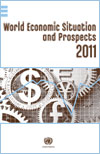World Economic Situation and Prospects
World Economic Situation and Prospects (WESP) is a joint product of the Department of Economic and Social Affairs, the United Nations Conference on Trade and Development and the five United Nations regional commissions. It provides an overview of recent global economic performance and short-term prospects for the world economy and of some key global economic policy and development issues. One of its purposes is to serve as a point of reference for discussions on economic, social and related issues taking place in various United Nations entities during the year.
World Economic Situation and Prospects 2011

After a year of fragile and uneven recovery, global economic growth started to decelerate on a broad front in mid-2010 and this slower growth is expected to continue into 2011 and 2012. The United Nations baseline forecast for the growth of world gross product (WGP) is 3.1 per cent for 2011 and 3.5 per cent for 2012, which is below the 3.6 per cent estimated for 2010 and the pre-crisis pace of global growth.
Weaknesses in major developed economies continue to drag the global recovery and pose risks for world economic stability in the coming years.
- Regional press releases:
- Interview UN Radio:
- Global recovery,
- Africa,
- Asia
- Available from: iBookstore
- Kindle
- Nook
2011-07-06
UN DESA | DPAD | World Economic Situation and Prospects
via un.org